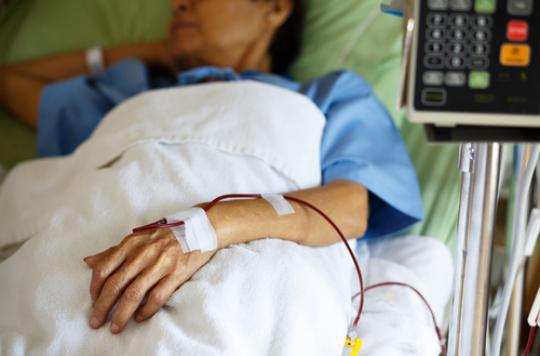Using a blood test, Japanese doctors were able to predict the survival time of cancer patients at the end of their life with an accuracy of 75 to 80%.

Japanese researchers have developed a blood test that can accurately predict how long cancer patients will survive at the end of their life. Thanks to that discovery presented at the congress ofEuropean Society for medical oncology (ESMO) which takes place in Singapore, scientists hope to improve the support for these patients and their relatives.
In France, in 2014, more than 150,000 patients with terminal cancer were admitted to palliative care. A difficult time for patients and their loved ones who have to make decisions about whether to stop treatment, or where they want to end their life. “Cancer patients hospitalized in palliative care want honest and accurate prognostic information,” notes Dr Yu Uneno, oncologist at the University of Tokyo (Japan) and responsible for the work. But this information must be shared with tact and in a way that respects their will not to lose hope ”.
Better choose treatments
The evaluation of the chances of survival makes it possible to determine whether a treatment can be given to a patient, and if it will bring a benefit. Also, chemotherapy is rarely administered to patients who have only 7 weeks to live, because of the serious side effects they can cause. In addition, strong sedatives are only used in patients who are likely to die in less than a month to prevent tolerance to the molecule from developing. It is therefore crucial for physicians to have reliable and precise tools to relieve patients as effectively as possible.
Japanese researchers therefore set about designing a prognostic test based on objective data. By studying the medical records of more than 5,000 patients treated at Kyoto University Hospital, the scientists developed 3 measurements taken in the laboratory from blood samples (levels of albumin, lactate dehydrogenase and cells immune called neutrophils).
These prediction models can be used at any time after initiation of chemotherapy and make it possible to give a prognosis of survival between 1 and 6 months, and to refine this prognosis during treatment.
To assess the accuracy of their test, doctors tested it in 1,015 cancer patients receiving palliative care, 166 of whom received palliative care at home. Their test predicted the death of these patients within 1 to 3 months with an accuracy of 75 to 80%. “An accurate prognosis would allow patients to prepare for their imminent death and organize palliative care,” says Dr Uneno.
.
















